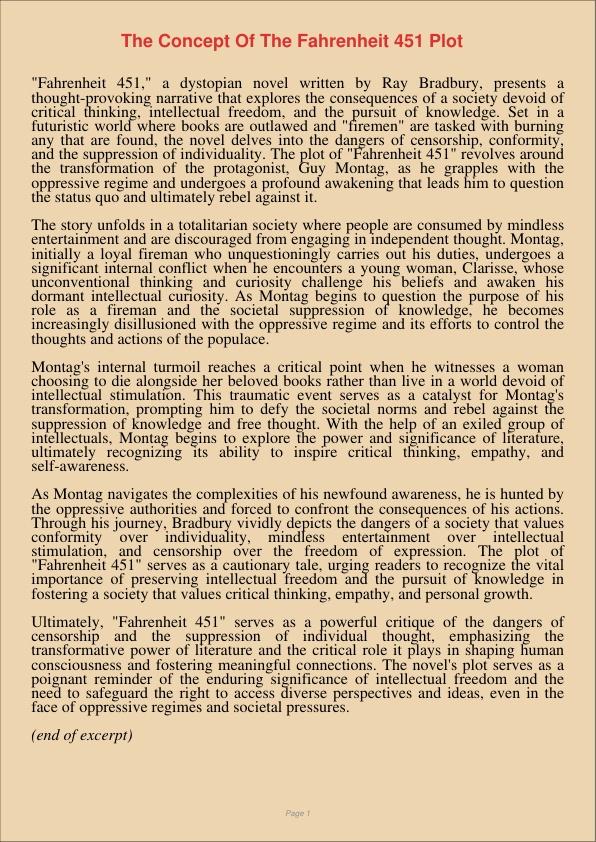The Concept Of The Fahrenheit 451 Plot
Jan 9, 2024
fahrenheit 451 plot
concept
Environmental Studies
Geography

“Fahrenheit 451,” a dystopian novel written by Ray Bradbury, presents a thought-provoking narrative that explores the consequences of a society devoid of critical thinking, intellectual freedom, and the pursuit of knowledge. Set in a futuristic world where books are outlawed and “firemen” are tasked with burning any that are found, the novel delves into the dangers of censorship, conformity, and the suppression of individuality. The plot of “Fahrenheit 451” revolves around the transformation of the protagonist, Guy Montag, as he grapples with the oppressive regime and undergoes a profound awakening that leads him to question the status quo and ultimately rebel against it.
The story unfolds in a totalitarian society where people are consumed by mindless entertainment and are discouraged from engaging in independent thought. Montag, initially a loyal fireman who unquestioningly carries out his duties, undergoes a significant internal conflict when he encounters a young woman, Clarisse, whose unconventional thinking and curiosity challenge his beliefs and awaken his dormant intellectual curiosity. As Montag begins to question the purpose of his role as a fireman and the societal suppression of knowledge, he becomes increasingly disillusioned with the oppressive regime and its efforts to control the thoughts and actions of the populace.
Montag’s internal turmoil reaches a critical point when he witnesses a woman choosing to die alongside her beloved books rather than live in a world devoid of intellectual stimulation. This traumatic event serves as a catalyst for Montag’s transformation, prompting him to defy the societal norms and rebel against the suppression of knowledge and free thought. With the help of an exiled group of intellectuals, Montag begins to explore the power and significance of literature, ultimately recognizing its ability to inspire critical thinking, empathy, and self-awareness.
As Montag navigates the complexities of his newfound awareness, he is hunted by the oppressive authorities and forced to confront the consequences of his actions. Through his journey, Bradbury vividly depicts the dangers of a society that values conformity over individuality, mindless entertainment over intellectual stimulation, and censorship over the freedom of expression. The plot of “Fahrenheit 451” serves as a cautionary tale, urging readers to recognize the vital importance of preserving intellectual freedom and the pursuit of knowledge in fostering a society that values critical thinking, empathy, and personal growth.
Ultimately, “Fahrenheit 451” serves as a powerful critique of the dangers of censorship and the suppression of individual thought, emphasizing the transformative power of literature and the critical role it plays in shaping human consciousness and fostering meaningful connections. The novel’s plot serves as a poignant reminder of the enduring significance of intellectual freedom and the need to safeguard the right to access diverse perspectives and ideas, even in the face of oppressive regimes and societal pressures.